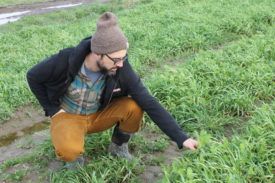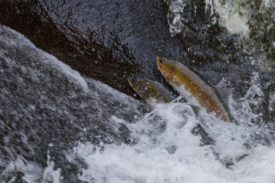Clark
Over the last few months, I’ve been exchanging emails with a friend about a nerdy but important question: does individual action inspire or substitute for systemic change? That is, if we all get our friends to make small, daily decisions to make their own habits more sustainable, will that truly hasten political changes that are needed to make the economy as a whole more sustainable?
It’s a question that probably doesn’t have a single answer. I’m a little more skeptical than my friend about the power of small individual actions, in part because of the extensive research on the limits of will power. Here’s an interesting example: people who exercise the willpower to buy green may subsequently slack off on other “moral” choices. To me, the exhaustibility of will power is closely related to the widely studied problem of decision fatigue: the simple act of making choices is enough to sap your self-control. So encouraging people to make lots of daily choices that are good for the planet could distract them from the few BIG choices that really matter: what home to live in, what car to drive, what appliances to purchase, and whether to put any time or money towards political or policy causes that you support.
In this month’s Orion Magazine, Sandra Steingraber (one of my all-time heroes!) comes down as something of a personal-action skeptic as well:
After writing a second book on environmental health—this one focused on pregnancy—I was asked to participate in an online project that would provide expectant mothers with tips synced to their prenatal calendars. In other words, a subscriber would receive, say, in month five (a period of rapid brain growth) advice about house paint (which can be neurotoxic). In month eight, she’d receive advice about choosing plastics free of plasticizers linked to preterm birth. And so on. The presumption was that, once invested in toxic-free products, parents-to-be would “ramp up.”
After a few months of this, it was my distinct impression that just the opposite was happening: when people believed they could avoid harm through acts of individual self-protection, they felt less urgency about eliminating those threats by pushing for environmental reform.
On the other hand, there are powerful historical examples of personal and political actions that reinforced one another. Take the temperance movement. Yeah, yeah, saloon-busting got a bad rap after Prohibition, but in reality the temperance movement was a major social and political force that vastly improved the health and quality of life for millions of Americans, particularly women and kids. And its power rested on coupling personal responsibility with political action.
So is fostering sustainability through personal action more like Sandra Steingraber’s experience, or like the temperance movement? I really don’t know.
Nicole
Coffer is a serene video, the second in a series by New York-based Lost & Found films, exploring the idea of home. John Coffer, a rural homesteader in upstate New York explains what made him leave his cosmopolitan life in urban Florida to live off the land more than 20 years ago. His examples of frugality, embracing imperfection, and an utmost respect for the things we value is an inspiration for all of us- whether urban or rural dwellers. Lost & Found has more place-based films to explore over on their website.
Alan
E-book of the week: Bike to Work. (I especially love this quote: “I thought of that while riding my bike.” – Albert Einstein, on the theory of relativity.)
Inspiring video of the week: scenes from 350.org’s “Moving Planet” events around the world.
Guerrilla stencil attacks of the week.
Eric
If you’re a Washington resident, head on over to Conservation Northwest’s website and read about the gray wolves naturally returning to Washington’s wild places. Then take a moment to realize that commonsense wolf management is not assured. Anti-wolf voices are trying to sabotage the state’s thorough and inclusive public process because they don’t like the results of the emerging management strategy. So it is vital that state officials hear from moderate and pro-wildlife voices, right now. You can submit comments online to support science-based wolf policies. Better yet, you can get yourself down to Olympia on October 6 to make your voice heard during public testimony. Do it.







